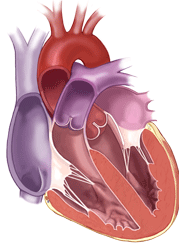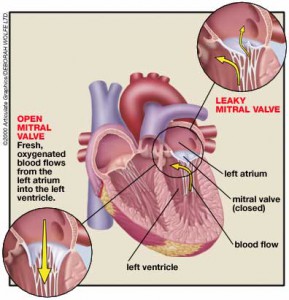Mitral valve prolapse (MVP) affects approximately 150 million people worldwide. Studies have shown that MVP is more common in women than in men. According to The Framingham Heart Study, 7.6% of women and 2.5% of men have MVP. Some forms of MVP seem to be passed down through families (inherited).
- Mitral valve prolapse often affects thin women who may have minor chest wall deformities, scoliosis, or other disorders,
- Mitral valve prolapse is sometimes associated with some connective tissue disorders, especially Marfan syndrome.
Cardiac valves allow the heart to move blood forward without leakage. Mitral valve prolapse occurs when the leaflets and supporting cords of the mitral valve have excessive tissue and weaken, leading to leakage (regurgitation).
 Your mitral valve is on the right!
Your mitral valve is on the right!
MVP is believed to be inherited, and is more common in females. Some features commonly associated with MVP include:
- Pectus excavatum (depression of the breast bone),
- Scoliosis (curvature of the spine),
- Abnormally straight thoracic spine (straight back)),
- Arm span greater than height,
- Unusual joint flexibility, and
- Low body weight.
MVP is frequently associated with other symptoms:
- Chest pain,
- Fatigue,
- Palpitations,
- Lightheadedness and/or dizziness,
- Shortness of breath,
- Anxiety and/or panic attacks,
- Headaches,
- Low exercise tolerance.
Symptoms often begin between the ages of 20 to 30. Patients with MVP may notice their first symptoms after an illness, injury, pregnancy, or emotional stress. Frequently they include chest pain, palpitations, and fatigue or anxiety attacks.
Symptoms may be more intense during emotional stress, or when overly tired, after unaccustomed physical activities, during menopause, or during menstruation. It is not unusual for symptoms to disappear spontaneously for long periods of time.
Read more about MVP here:
http://www.cardiac-risk-assessment.com/heart-information/valve-disease/mitral-valve-prolapse-mvp
Hope this helps,
Dr T

